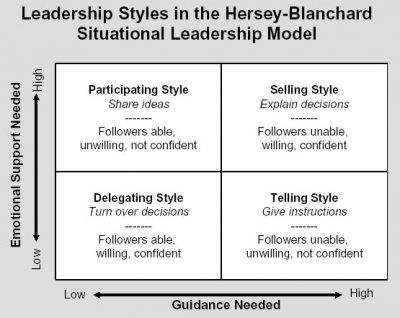Leadership Styles
Dear Pastors
Leadership Styles
I am more convinced than ever that pastoral leaders need to learn to be adaptive in the way they lead. In other words to adopt a leadership style that is appropriate for the people you are working with, to the tasks that need to be done and to the environment you are working in.
Typically what happens is that we adopt a style that ‘fits’ our personality and temperament and we apply that style all of the time. For example some of us are more comfortable in a participatory style, others more consensus finding, others more directive etc.
The trick is to learn to be adaptive according to the situation you find yourself in.
In 1969 Paul Hersey and Ken Blanchard came up with this model and it very quickly found it’s way into management and leadership literature. The fundamental principle of the situational leadership model is that there is no single ‘best’ style of leadership. Effective leadership is task-relevant, and the most successful leaders are those who adapt their leadership style to the performance readiness (ability and willingness) of the individual or group they are attempting to lead or influence. Effective leadership varies, not only with the person or group that is being influenced, but it also depends on the task, job, or function that needs to be accomplished.
Can I encourage you to spend a little time ‘studying’ this diagram. It’s packed with insights.

Ken Blanchard then went on to detail some further ideas. He identified four ‘levels’ of development that are present in any team of adults. Here they are:-
Development levels
Blanchard's situational leadership II model uses the terms ‘competence’ (ability, knowledge, and skill) and ‘commitment’ (confidence and motivation) to describe different levels of development. You’ll see these reflected in the graphic.
According to Ken Blanchard, “four combinations of competence and commitment make up what we call development levels”.
- D1 – Enthusiastic Beginner: Low competence with high commitment
- D2 – Disillusioned Learner: Low/middling competence with low commitment
- D3 – Capable but Cautious Performer: High competence with low/variable commitment
- D4 – Self-reliant Achiever: High competence with high commitment
Pastors. If we can be attentive and highly tuned to both the competence and commitment of the people that make up our various teams (staff, elders, volunteers), then we will create work and ministry environments where people feel understood and appreciated and as result want to give their very best. If we are adaptive in our leadership style(s) then it is highly likely that folks who are currently D1 will be motivated to become D4. You watch!
Blessings
Alan
Alan Vink is currently the Executive Director for LeadershipWorx. Prior to this role he has been the Executive Director of Willow Creek Association NZ (WillowNZ), a Baptist pastor (23 years), Bible College teacher, and church consultant.
